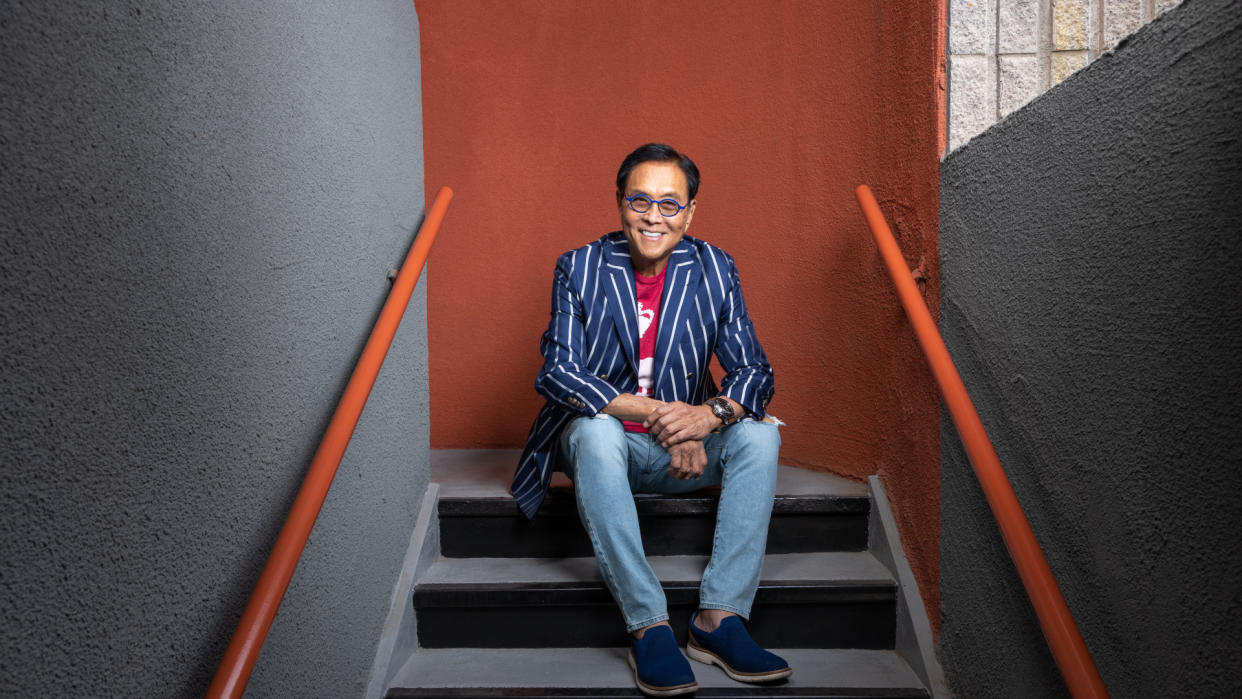‘Rich Dad’ Robert Kiyosaki Says Smart People Don’t Save Money For 3 Reasons

Robert Kiyosaki, author of the best-selling finance book “Rich Dad Poor Dad,” teaches money secrets that sometimes go against mainstream views.
Read More: Rich Dad’ Robert Kiyosaki Reveals Why the 401(k) Is a ‘Horrible’ Retirement Plan
Try This: 5 Genius Things All Wealthy People Do With Their Money
One of his most controversial takes is that smart people don’t save money. Here are his three reasons for that.
Taxes
First, Kiyosaki notes that the government incentivizes consumer behavior through taxes. For example, there are high taxes on cigarettes and alcohol because governments want to discourage their consumption.
He asks us to consider why governments don’t incentivize saving through tax policy. There are many theories, but the bottom line is that if you want to pay less in taxes, saving isn’t the best option.
Instead, consider a tax-advantaged retirement account like an IRA. These have tax incentives that can help you keep more of the money you save. However, they also have restrictions on withdrawals like age requirements that can limit your access to the capital.
Inflation
Next, Kiyosaki calls out the hidden tax of inflation. This occurs when the government prints more money.
As that happens, the amount of money you have becomes a smaller slice of the overall pie, which decreases your purchasing power. Just think of how much more you could buy with $100 in the 1930s than you can today.
The average annual inflation rate in the United States is around 2% to 3%. But it can be significantly higher in any given year.
For example, it was 7% in 2021. That means the purchasing power of the same $100 went down by 7% in 12 months.
You can avoid this problem by earning a higher interest rate on your capital than the annual inflation rate. For example, if you earned 8% on your savings in 2021, you would have outpaced inflation.
The issue is that even a high-yield savings account may not beat inflation. This is why Kiyosaki says saving money is a difficult way to get rich.
Trending Now: Robert Kiyosaki: 7 Ways To Become Wealthy Beyond the 9-to-5
Risk-taking
Finally, Kiyosaki says that saving money often leads to less risk-taking, which makes it harder to build wealth.
He said, “People who work hard and save often think that investing is risky. And when you think something is risky, you avoid learning.”
The argument boils down to the idea that focusing too heavily on saving can actually make it harder to reach your financial goals. However, Kiyosaki doesn’t cite any statistics or studies to back up this point.
Why Kiyosaki Recommends Investing Instead of Saving
Kiyosaki’s preference against saving doesn’t mean he thinks you should spend all the money you earn. He recommends investing the capital instead, which he says grew his money exponentially.
You certainly can build wealth faster by investing. Stocks, real estate and other assets often outpace inflation and interest rates from high-yield savings accounts. However, you can also lose money faster this way.
Savings accounts won’t build your wealth quickly, but they’re also mostly risk free. So, the question becomes whether you’re willing to accept some risk to build up your portfolio faster.
There’s not an inherently right or wrong answer. It depends on your preferences, tolerance for losses and long-term financial goals, among other factors.
Other Philosophies on Saving
Kiyosaki’s views on savings aren’t necessarily mainstream. Other financial experts are as enthusiastic about saving as Kiyosaki is against it. Here are a few examples.
Dave Ramsey
Dave Ramsey is a major proponent of saving. His financial philosophy starts with saving $1,000 in an emergency fund. He also recommends keeping at least three to six months of expenses in a savings account as you grow your wealth over time.
Ramsey’s philosophy focuses more on overall financial wellness than on building wealth. He wants people to be prepared for unexpected expenses in life and believes that’s more important than expanding your portfolio as quickly as possible. This is a safer approach than what Kiyosaki recommends.
Ramit Sethi
Ramit Sethi is another popular financial expert with a show on Netflix and a New York Times-bestselling book. Unlike Kiyosaki, he believes in allocating 20% of your income to your savings goals.
Sethi says it can be helpful to think about short-term, mid-term and long-term savings goals. A short-term goal might be to purchase a new laptop, while a mid-term goal could be saving for a down payment on a new car. Long-term savings goals are typically for larger purchases, such as your first home.
This approach gives you the flexibility to find your ideal savings balance. You can put the full 20% of your income into a retirement account or use it all to save for a home. It’s entirely up to you with this savings philosophy.
Choosing Your Ideal Savings Strategy
Even financial experts don’t agree on the best approach to saving. So, which approach is right for you?
The answer depends on your preferences and goals. If you’re nervous about an unexpected expense ruining your finances, you may want to focus on building an emergency fund like Ramsey suggests.
Or maybe you feel confident about paying unexpected expenses and prefer to start building wealth now. If so, Kiyosaki’s advice to invest your money instead of saving it may be the right solution.
It’s also important to note that your ideal savings philosophy can evolve. For example, your goal in your 20s may be to start building wealth. But as you age and get closer to retirement, that could change to preserving the wealth you already have.
More From GOBankingRates
I'm a Shopping Expert: 9 Items I'd Never Put in My Grocery Cart
This is One of the Best Ways to Boost Your Retirement Savings in 2024
This article originally appeared on GOBankingRates.com: ‘Rich Dad’ Robert Kiyosaki Says Smart People Don’t Save Money For 3 Reasons
